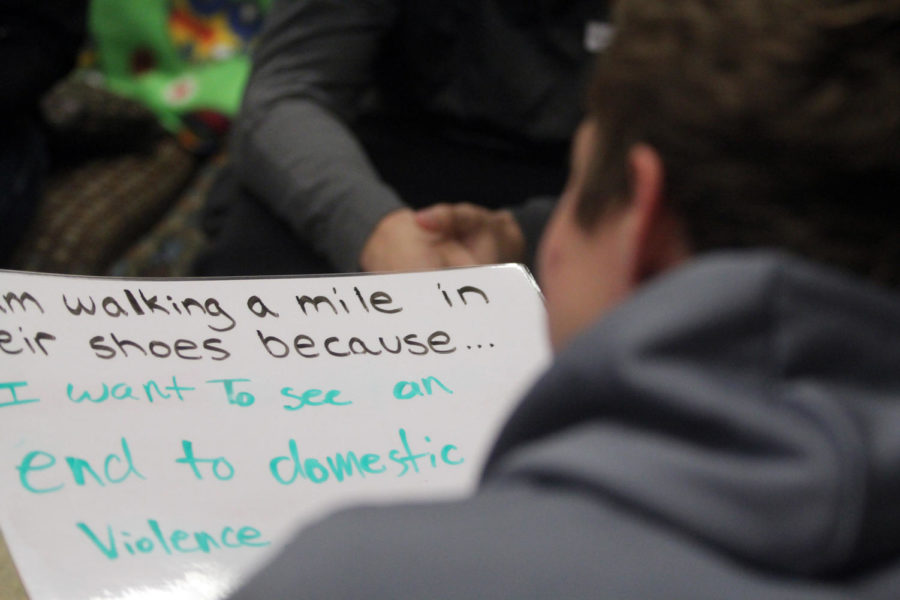‘A Walk in Their Shoes’: Event raises awareness about domestic abuse
October 19, 2014
Domestic violence has splashed national headlines this fall because of the high profile cases in the NFL, but hundreds at Iowa State gathered on Central Campus on Sunday to give the problem a human face.
A Walk in Their Shoes, in its second year of existence, aimed to raise awareness of the pitfalls of domestic violence and to highlight resources available to both prevent and address the problem.
Alpha Chi Omega sorority collaborated with the Margaret Sloss Women’s Center and the Assault Care Center Extending Services and Support organized the event.
Alpha Chi Omega’s philanthropic cause is domestic violence, and A Walk in Their Shoes is one of the sorority’s biggest fundraisers. All proceeds from the event will be donated to ACCESS in Ames.
Jennifer Jensen, senior in agronomy, environmental science and biology and Alpha Chi Omega’s vice-president of philanthropy, organized this event in order to help stop domestic violence.
“The goal of the event is to make others aware that domestic violence can happen anywhere,” Jensen said. “We wanted it to be more educational, as well as spread awareness. It’s important, even if you aren’t effected personally, to know how to handle those situations when it may happen.”
Anasia Sturdivant is the Youth Domestic Violence Coordinator at ACCESS who helped make this event possible. She said the ultimate goal of the event is meant to teach others where they can get help on a domestic violence issue.
“The goal is for everyone here not only to leave with peace of mind, but also to gain knowledge of where these sources are at,” Sturdivant said. “So if anything were to happen, they know where to start to get help.”
In order to help spread awareness, groups of walkers visited over ten booths stationed around the route. Some stations included ACCESS, Iowa State Martial Arts, Student Counseling Services and Society for the Advancement of Gender Equality.
The stations were meant to offer resources to those who are suffering from domestic violence, or know someone who may be.
Lauren Conzett, a junior in apparel and merchandizing and a member of Alpha Chi Omega, finds that helping the Iowa State community is rewarding in many ways.
“It does help having events like this pay off, because it’s a cause that falls under the radar,” Conzett said. “Not many people know about the shelter here in Ames or the Margaret Sloss Center.”
The free event is called A Walk in Their Shoes because it is meant not just for women, but for men and children as well. It stemmed from the national event, A Walk a Mile in Her Shoes. However, the organizers of this event wanted to do something different.
“We wanted to get away from the men wearing heels because it more funny than serious,” Jensen said. “The whole idea of why they’re walking just went out the window.”
A Walk in Their Shoes works to be more inclusive of everyone, and recognizes women are not the only victims of domestic violence.
“You might miss the signs, so it’s important for people to know that abuse is not just physical, but mental and emotional as well,” Jensen said.
Jensen said events like this help victims find resources to cope with their problems.
“It’s helpful to teach people how to get those services, whether it’s counseling or getting a restraining order or just talking about it,” Jensen said.
Sturdivant said events such as A Walk in Their Shoes are essential to open people’s eyes to the issue.
“We want to teach them ‘if you see something, say something’ rather than try to ignore it,” Sturdivant said. “We hear all the time ‘it’s not my business,’ but that’s the culture we’ve been raised in.”
Jensen said getting people to talk about it and not shy away from it is important in stopping the issue.
“I’ve had a friend effected by this as well, and that feeling of not knowing what to do really brought it to my attention,” Jensen said. “I think it’s important to educate people and let them know what’s out there.”
Sturdivant is not shy about sharing her own experiences with domestic violence, and finds that talking about it helps teach others about the issue.
“I was a victim of domestic violence growing up. Now I’m able to accept that and talk about it openly, but I didn’t even realize it was for the longest time,” Sturdivant said. “When I was 20 or so, I talked with my friends and I realized their family life was so different than mine. What was normal to me wasn’t normal to other people, but I didn’t know that until I came to Iowa State.”
ACCESS and the Margaret Sloss Women’s Center are currently accepting volunteers.
If you are aware of a domestic violence situation, or are currently in one, contact ACCESS on the website or by calling one of their crisis lines. The lines are open 24 hours, and the services are free and confidential.
Sexual Abuse Crisis Line: 1-800-203-3488
Domestic Violence Crisis Line 1-855-983-4641
Shelter Services Crisis Line 1-855-696-2980







